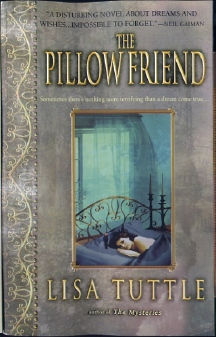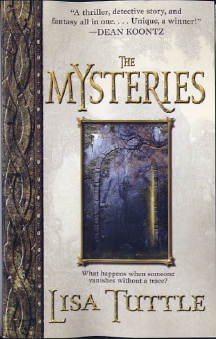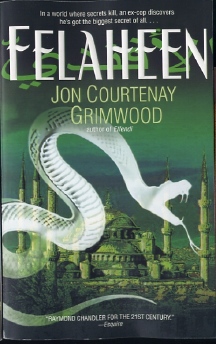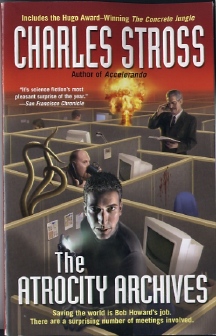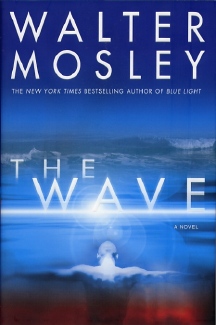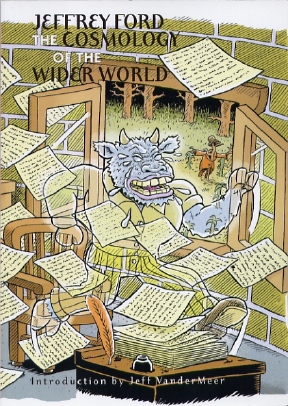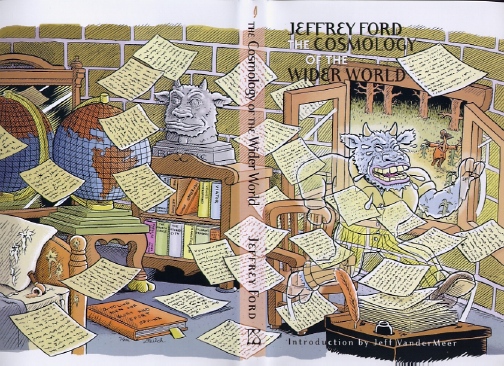|
|
|
This Just In...News from the Agony Column
|
12-30-05: Good Night and Good Luck |
||||||||||||
Say
Farewell to 2005 with Trade Paperbacks
Eyes on the Rolling Shelves yesterday, or today, really, will have noted the addition of a couple of Lisa Tuttle titles. I'm rather surprised that we're seeing two titles by a single author released simultaneously, but nonetheless glad. Thus, we get 'The Mysteries' (Spectra / Bantam / Del Rey ; January 3, 2005 ; $12.00) and 'The Pillow Friend' (Spectra / Bantam / Del Rey ; January 3, 2005 ; $12.00) in these nicely designed complementary trade paperbacks at what I'd consider a bargain price. Now yes, 'The Pillow Friend' first made the rounds some ten years ago, but we'll take what we can get, especially since the blurry-but-disturbing photo inserts are included here. The title gives you a pretty good idea what this is all about. It's the old "be careful what you wish for" warning dressed up as an antique doll that takes on threatening, surreal life for Agnes Grey. There's a blurry photo in this book that is deeply disturbing and suggestive of how disturbing and suggestive Tuttle can be. Of course, any novel with a chapter titled, "The Imaginary Meat" is the kind of book we both love to read and greatly fear reading. Tuttle rhymes with subtle and to my mind that's no coincidence. Her work is character driven, carefully written and slowly gripping. 'The Pillow Friend' is the kind of novel that becomes a sort-of pillow friend itself. In that it's a friend to the pillow because the chances are you'll stay awake reading it, thus sparing your pillow a night's work.
Finally, both books look forward to Tuttle's forthcoming hardcover, 'The Silver Bough' which, in no coincidence whatsoever, is also set in Scotland. The premise, we're told, is that a landslide cuts off a remote Scottish village not only from civilization, but reality itself. The three-page excerpt displays Tuttle's prose prowess and offers a nice glimpse at the faerie-invasion plot (I suspect). So that would explain why we get the two-fer; as it offers the publishers a coupld o chance to prime the pump for the forthcoming title. Not a bad idea, and with Tuttle, we know the quality is going to be there. One only hopes for both Tuttle and the publisher that the nice TPB presentation makes readers want the hardcover even more.
So four book, fifty bucks, I let you off easy at the end of this year, huh? I'll be back next year with some new features for the site, lots more reviews, interviews and froth-mouthed ranting. Time to work up a good head of steam now, so have a great New Year. Hide the Visa card from me, ok? |
|
12-29-05: Walter Mosley Rides 'The Wave' |
|||
Riding
Towards a Rant
So Walter Mosley -- a hell of a guy. I saw him speak at Left Coast Crime when was it, 2004? The brain is fizzling. I was mightily impressed, let me tell you. Mosley spoke with a passion and a precision that are the hallmarks of a great writer. In a setting where blandness is something of a virtue, Mosley was anything but bland. He gave a pointed and political speech that notched home on every target he took aim at. Moreover, we've loved his mysteries here at the Agony Column. Terry D'Auray raved about 'Little Scarlet', in a review that even got extra pages so her perceptive comments would not have any chance of spoiling the plot. Of course, Mosley's mysteries have always received raves across the board; he's a well-respected writer who deserves his kudos. You can hear the "However..." right? It's obvious, I admit it. And the "however" comes in relation to his science fiction. In general, I'm pretty interested in science fiction that comes from writers who are not known for science fiction, but for reasons that are difficult to hone in on, I've not been particularly piqued by Mosley's SF. There's not a whole lot of it, true. There's a novel, 'Blue Light' and a short story collection, 'Futureland'. I gave both very close looks but neither looked super-compelling to me. So, I let them go but kept Mosley in mind for future SF. Interesting thought, that; "future SF". The future's future. File it under recursion 101 and go forth to read more books. So, some eight years later, here comes another Mosley novel, 'The Wave' (Warner Aspect Hardcover ; January 3, 2006; $22.95), and once again, I'm intrigued; this time just enough to want to read it. So whats happened? Well, this could have been -- and might still be a sequel to 'Blue Light', but if that's the case, it hides it well enough to make it potentially worth reading even though I skipped the first book. It's also got the virtue of brevity. At 209 pages, with a small book size, I'd be surprised if it were much longer than Jeffrey Ford's novella, 'The Cosmology of the Wider World'. Open it up in the bookstore and you'll find it has the kind of close, quiet prose that draws you in and doesn't grandstand. The premise is pretty interesting, and that's where I get hooked. Errol is just a guy whose father had been dead for some several years. Lotsa folks like that around, Errol gets prank phone calls; again, nothing too far out of the ordinary. But Errol's phone calls ramp up to the point where the caller claims to be Errol's dead father. When Errol pops over to the graveyard where his dad was buried, he finds a man who looks and acts like a younger, healthy version of his father. Homeland security death squads and mad scientists soon enter Errol's life. And The Wave keeps rolling on. This time around, Mosley seems to be going for a sort of sci-fi horror vibe, and I like that. Moreover, I think that's a lot easier to pull off than a straight SF story, and in 209 pages, well, give me a few chills, a character I can grab on to and a plot that hangs together -- I should be happy. We'll see if I can get this into the queue. So, I was just walking around, doing some chores and cogitating on the differences between 'Blue Light' and 'The Wave'. Clearly, 'Blue Light' takes a more positive approach. And it struck me that it was published in 1998 and presumably written in 1997. Back before the Department of Homeland Security. Things were in general pretty good back then. Oh, there were some outrageous stunts going on, but the world was sort of at peace and seemed to be heading towards more of the same. Our nation was debating what to do with the fiscal surplus. Heady times, indeed -- and perhaps not the best times to write science fiction. Science fiction seems to be stronger when it originates in bad times, as a response to bad times. Back when 'Blue Light' was written, the response to some incursion of "otherness" was not "homeland security death squads". Indeed, those were not even in our imaginary vocabulary. Our response was more likely to be, "How can we make a buck off that?" Or (even worse, fictionally speaking) "Oh, goody! Otherness!" No, SF seems to be a lot better when times are bad, whether it's an ex-writer of propaganda transforming 1948 into '1984', or a hermit typing on a Hermes typewriter, transforming 1984 into the computerized corporate nightmare of 'Neuromancer'. Mosley then, is truly just riding 'The Wave' of badness that is growing each and every day. As Average Joe's finances plunge ever deeper into the toilet, as nations embark upon battles that by definition can never end, as there seems to be a distinct fan shortage given all the shit that's washing ashore, science fiction gets Fat and Unhappy. As Willy Ley once put it in one of his many primers on how rockets work, all that bad news gives science fiction writers, "something to push against". Indeed, since the turn of the century, we've graduated from simple chemical rockets to nuclear propulsion in the SF biz. There's a megatonnage of bad news to exploit. And SF readers can feel as happy as pigs in, well, the stuff that's not hitting the fans. Moreover, they can sit back and smile as the SF genre pretty much conquers all of literary fiction. Many is the writer who has told me that we now live in a bad science fiction novel, and I'll unhappily agree. The world we live in is sort of like 'The Space Merchants' without the wit. We live in the very badly art-directed version of 'Blade Runner'. The world of '2001: A Space Odyssey' looks like a vacuum cleaner commercial compared to reality. And can we ever get the goddamned hell away from friggin' '1984'? It should have been way obsolete over two decades ago, but here we are and damn me to hell if War is not Peace and Ignorance is Not Strength. Where is my flying car? So here's to more bad times and good science fiction. With an unhappy new year, we can look forward to a year full of great, gnarly, teeth-gnashing science fiction. It's one giant ball of Angst out there. Grist for the mill, fodder for great art. Life may suck, but reading will rule. |
|
12-28-05: Jeffrey Ford Explores The Cosmology of the Wider World |
|||||
The Minotaur Talks, You Listen
This may be the only news update I do this week, because I want to use this in-between time to get some new stuff up and running, and I've got to prepare the site for next year. New "06-news" directories and everything! Stop me or I'll turn this site in on itself, and write about nothing but updating the site. Today I'm typing today's update. However, as new titles arrive, I may not be able to hold myself back and I will be doing the Rolling Shelves. In fact, theyve completely overflowed, and as soon as the college-age child wakes, I'll reveal to you the rest of this PS bonanza. Utterly mind-boggling. But I just can't hold my tongue about this one, so all my protests may be for naught. Jeffrey Ford should be well-known to my readers. Well, he's well-known to me at least, though I suppose that's more based on anticipation than actuality. That is, since I read 'The Portrait of Mrs. Charbuque' early on in the creation of this website, I've been slavering away to have more work from this important writer. His follow-up novel (as I see it, at least) only came earlier this year, and 'The Girl in the Glass' is easily one of this year's best. (Yes, there will be a list; please be patient. I dont hold to no "Year's Best" list making before the damn year is up. How silly!) But between 'The Girl and the Glass' and 'The Portrait of Mrs. Charbuque', it's easy to think that Ford is a slightly odd but mostly mainstream novelist. Those books are outstanding examples of accessible writing, and to my mind perfectly suited for the bestseller lists. More fool to the booksellers who managed not to promote the living heck out of these! If ever there was a book guaranteed to bring back a customer with thanks, it was 'The Girl in the Glass'. So, OK, great, easy-to-get-into stuff. But that's not all the Ford has done by any means. Ford started out with 'The Physiognomy', which, while excellently written and pretty accessible, is undeniably odd. A strange mixture of cruelty and fantasy, science and satire, fiction and meta-fiction, 'The Phsyiognomy' is most importantly utterly unique -- outside of the sequels Ford wrote, 'Memoranda' and 'The Beyond' there's nothing like it for a mixture of clean contemporary prose and bizarre flights of imagination. And foolish me, I thought Ford wouldn't be going back to that style. But with 'The Cosmology of the Wider World' (PS Publishing ; July 31, 2005 ; £10.00 TPB / £25.00 HC), Ford once again whisks readers from the workaday world into the utterly strange. And he returns to the themes of his earlier works; the worlds that we construct in our minds, the ways in which the rules of our own logic trap us. Belius is the minotaur born to a shocked farm couple. He's intelligent, thoughtful, half-bull and half-human. Sitting in his refuge in the coral tower, ensconced in an other-dimensional netherworld, he's a philosophical sort who is writing his masterwork 'The Cosmology of the Wider World'. But alas, he's having some problems in his creation, because he can't write effectively about what's outside until he comes to terms with what's inside; that is, his own Halfling nature. Conversations with his talking animal friends, Vashti the Owl and Pezimote, the tortoise may help matters or may make them worse. And you've only got 173 pages of gorgeously printed PS publishing novella to find out what's what and why. Oh how we love the novella, and oh how we love it even more when it's Jeffrey Ford being, really, really weird. Why publishers in the US aren't falling over themselves trying to publish this and the rest of the PS novella line is beyond me. In our time-compressed culture, where we're bombarded with messages that reading is on the decline, it seems to me that the novella offers the perfect solution. These are totally adult books for adults and fully-realized works of fiction, just slightly shorter than your average novel. Damn, were I at one of the major houses, I'd be all over these and popping out novellas as fast as possible. Especially when they're by writers like Ford who is utterly charming and reads so easily, yet provides so much pleasure per word. Well, at least PS is here to fill in the gap that short-sightedness, marketing research and bookseller feedback leave wide open. All hail! Run, dont walk. Etc. So, in case youre wondering that is NOT the work of Gahan Wilson on the front cover. The cover is by Kim Deitch, and it's very nice and quite appropriate to the tone that Ford strikes. (And there could be so much more; see the interview below!) I guess I'll have to scan the whole damn cover and show you the back, with all the books in the bookshelf. Or not. Suffice it to say that some very recognizable name and titles are there. The introduction by Jeff VanderMeer is every bit as perceptive and non-spoilerish as you could hope for. Definitely read it beforehand and you'll be glad you did. I emailed Jeffrey Ford and asked him a couple of questions about this book, and he was kind enough and quick enough to email me back before the deadline.
JF: Rick, Id say that it is like The Physiognomy in that it was completely confabulated by way of the imagination and does not rely on historical research as The Girl in the Glass and Mrs. Charbuque did. In my mind, the writing in it is different than in The Physiognomy. Its a bit more lush in the Wider World parts and quite a bit less laced with irony than is Cleys perspective. Of course, Im probably the last person to have an insightful opinion about this. There are connections to The Physiognomy through my first novel Vanitas. A character from that early book by the name of Scarfinati is mentioned in The Cosmology and also plays a sizeable part in the latter two novels of the trilogy (Memoranda & The Beyond). RK: You seem very fascinated with the mental worlds that we construct for ourselves. Any particular reason why? JF: It might be because thats where fiction and life are the same. As much as we like to call it Reality, we live every day in a mental world of our own construction, built with our assumptions, beliefs, superstitions, hopes and desires. Fiction is other mental worlds we have constructed in order to explore possibilities and to give form to our ideas and feelings. RK: Will there be a US edition of this? JF: I dont really know about this yet. We havent tried to sell it over here yet, and the phones not exactly ringing off the hook, but who knows what the future will bring? Kim Deitch, who did the wonderful cover for the book, has told me he would possibly be interested in doing a fully illustrated version of it if we could get some decent dough for it. That would be interesting. Theres another part, of equal length, completed that PS might be publishing next year, and there is a third part that Ive done some work on but not finished yet. RK: As a writer, you cover a wide range of subjects from the ultra-accessible (and sellable) spiritual con-men of 'Girl in the Glass' to the rather outre visions in Cosmology. Do you get some sort of writing whiplash from one to the other? And what's next? JF: No, I enjoy switching styles, moving from one type of story to another. Id get bored if I was writing the same type of story in the same style over and over again. As a writer I always want to be learning more about writing. Some writers see fiction that is not like their own and condemn it because of that. I try to see whats good in it, what I like, what devices I can learn or techniques of style I can exploit or explore. This can perhaps be viewed as a detriment in that readers very often want you to stay in a fixed location. Im sure there are quite a few writers who, for fear of tarnishing their “image,” would never attempt a talking animal book. You know, theyre just too constantly profound. Luckily, I cant take myself that seriously. As for whats coming up. I have a collection, The Empire of Ice Cream, coming out from Golden Gryphon – 14 stories and a new novella. My story, “The Boatmans Holiday,” will appear in Years Best Fantasy and Horror #19 edited by Datlow, Grant & Link, and another of the year end best of anthologies I cant mention yet. “Bright Morning,” will be appearing in a slipstream anthology edited by James Patrick Kelly and John Kessel from Tachyon (cant recall the title right now but its going to be really great). Ill have a story, “The White Man,” in the new Omnidawn anthology, a story “The Dreaming Wind,” in Datlow and Windlings upcoming Coyote Road anthology (YA), and a science fiction story of sorts, “The Dismantled Invention of Fate,” in a science fiction YA anthology. Im presently working on a new novel, tentatively titled The Drowned Life, but cant say anything more about it just yet. |
